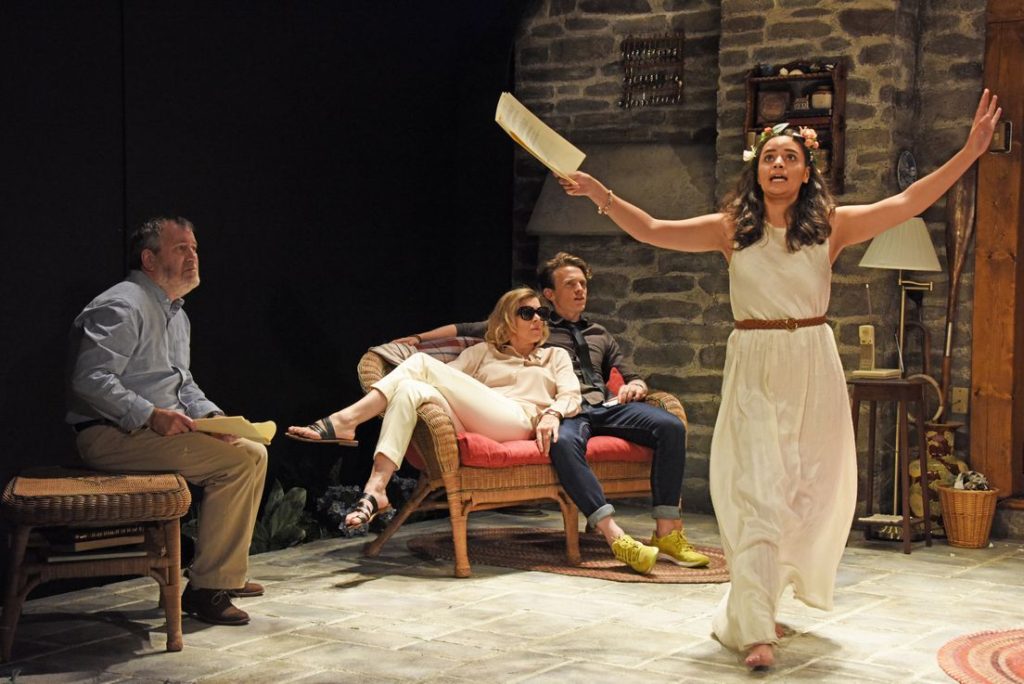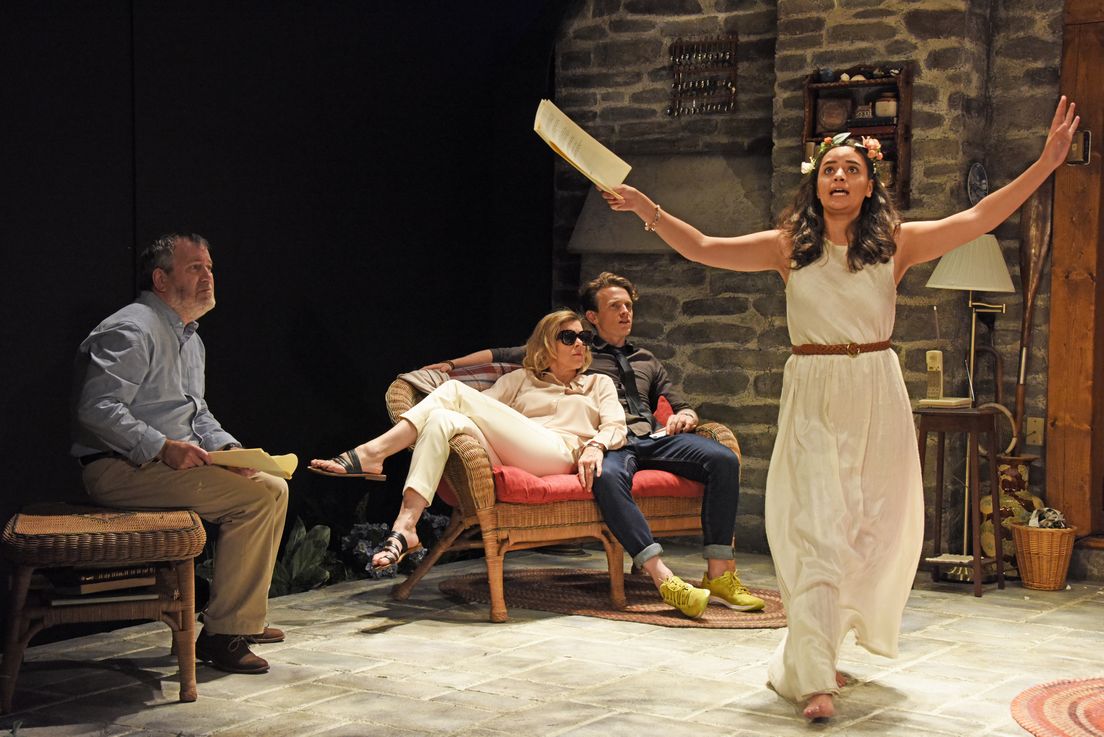
Writer Christopher Durang has said, ‘Throughout my life, I keep reacting and reacting to Chekhov.’ Fair enough, there is nothing amiss in taking inspiration from one of the great masters. However, more worryingly, Durang has described Vanya And Sonia And Masha And Spike as a piece that takes ‘Chekhov characters and themes and puts them into a blender.’ As a creative process, that sounds messy, and there is certainly a distinct a lack of cohesion and clarity of purpose in the first half of this play. Some of the Chekhovian allusions are amusing, but they are overdone, and ultimately more than a little wearying. There is, for example, a repeated reference to nine or ten cherry trees which may or may not constitute an orchard. However, in the second half there is rather less of Chekhov and rather more of Durang, and his play comes alive in a much more satisfying fashion.
The action takes place in an American farmhouse. Designer David Korins has created a convincingly detailed image of rustic comfort, with wood beams, a stone-flagged floor, and wicker furniture. We learn that the middle-aged occupants are Vanya and his adopted sister Sonia, and that they have lived there all their lives, having stayed to care for their parents, who have now died. In being so dutiful, Vanya and Sonia have let opportunities pass them by. Their days follow rigid routines, and they bicker over trivia. Though some of the expository dialogue is rather clumsy, Mark Hadfield and Rebecca Lacey succeed admirably in making the smallness of these characters’ lives both amusing and rather touching. They epitomise the kind of people who have come to accept that ‘life’ is something that other people lead, though Sonia occasionally expresses her frustration in episodes of crockery-throwing violence.
Meanwhile, their older sister, Masha, has had a glittering career on stage and screen, and it is she who has provided the money that has allowed them to keep the house. Masha turns up unexpectedly, with toy boy Spike in tow, and drops the bombshell that she is going to sell the house. Masha is the kind of needy diva who panics at the slightest hint that she might not be the centre of attention. Janie Dee has great fun playing this star whose glamour is fast fading. Masha’s monstrous self-regard is tempered by self-awareness; she knows she is fighting a losing battle against the ravages of time. She meets a young fan, Nina (Aysha Kala) who coyly asks for her autograph. Masha is delighted by Nina’s breathless adoration, but she is simultaneously threatened by her youth and beauty. Janie Dee conveys Masha’s conflicted emotions to great comic effect, switching from false modesty to vicious put-down in the twinkling of an eye.
Though Vanya, Sonia and Masha form a familiar Chekhovian trio, there are two characters that seem to come from entirely another world. Spike is a shallow show-off, all too aware of his youthful good looks and given to stripping down to his briefs at every opportunity. Lewis Reeves plays this narcissistic, would-be actor with uninhibited, chest-baring gusto, but there is a cartoonish quality to this role that I found uncomfortable. The same is true of Vanya and Sonia’s African-American cleaner, Cassandra, who, like her Greek namesake, can predict future disasters with uncanny accuracy. She also reveals that she is a skilled practitioner of voodoo. Michelle Asante plays this role with a creditable degree of conviction, but Cassandra’s far-fetched psychic machinations do not seem to belong in Vanya and Sonia’s story of earth-bound domestic tensions.
Though there are some ill-matched ingredients in Christopher Durang’s blender, the second half of the play features some passages of very good writing. The best moments are those when it is least comic, and the humanity of the characters is allowed to shine through. Such a moment occurs after Masha has bullied everyone into attending a fancy-dress party as characters from Snow White And The Seven Dwarfs. Sonia refuses to go as Dopey, and instead opts to be the wicked queen, dressed to kill in tiara and sequinned gown. On her return she reveals that she has had a good time, her first good time in very many years. She may even have an admirer. Rebecca Lacey invests this scene with great poignancy. Sonia is a woman whose life is a tale of ‘might-have-been’, but who now glimpses the possibility of new opportunities. That’s a truly Chekhovian idea, and Lacey delivers it very movingly.
Equally moving is a scene where Vanya rails against the fragmentation of modern society. He looks back longingly to those days in the 1950s when the entire family, the entire nation, would sit down to watch I Love Lucy or The Ed Sullivan Show. As a gay man he knows he is being overly nostalgic and that he is glossing over the many faults of that era, but he bemoans the loss of a common sense of values, the loss of any real sense of community. In this scene Mark Hadfield shows Vanya as initially nervous and hesitant, but gradually his simmering anger gives him confidence, and he becomes impressively impassioned.
Vanya And Sonia And Masha And Spike was a Broadway hit, and in 2013 it picked up a Tony Award for Best Play. The cast included David Hyde Pierce as Vanya and Sigourney Weaver as Masha, and I wonder if much of the play’s success depended on the exceptional strength of the acting. Here too, under Walter Bobbie’s fine-tuned direction, we have a production blessed with a very strong cast. Vanya And Sonia And Masha And Spike does not quite convince as an entirety, but it offers much to be enjoyed, and the performances are splendid. ★★★☆☆ Mike Whitton 12th June 2019


